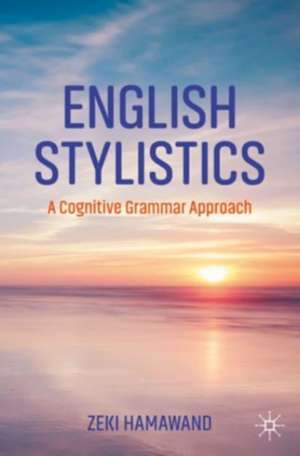English Stylistics: A Cognitive Grammar Approach
Autor Zeki Hamawanden Limba Engleză Paperback – 27 mar 2023
Preț: 360.98 lei
Preț vechi: 434.92 lei
-17% Nou
Puncte Express: 541
Preț estimativ în valută:
69.08€ • 75.01$ • 58.03£
69.08€ • 75.01$ • 58.03£
Carte disponibilă
Livrare economică 02-16 aprilie
Livrare express 18-22 martie pentru 24.58 lei
Preluare comenzi: 021 569.72.76
Specificații
ISBN-13: 9783031225550
ISBN-10: 3031225554
Pagini: 178
Ilustrații: XV, 178 p.
Dimensiuni: 155 x 235 x 14 mm
Greutate: 0.28 kg
Ediția:1st ed. 2023
Editura: Springer International Publishing
Colecția Palgrave Macmillan
Locul publicării:Cham, Switzerland
ISBN-10: 3031225554
Pagini: 178
Ilustrații: XV, 178 p.
Dimensiuni: 155 x 235 x 14 mm
Greutate: 0.28 kg
Ediția:1st ed. 2023
Editura: Springer International Publishing
Colecția Palgrave Macmillan
Locul publicării:Cham, Switzerland
Cuprins
Prologue.- Chapter 1: Key Concepts.- Chapter 2: Historical Overview.- Chapter 3: The Cognitive Framework.- Chapter 4: The Idealization Theory.- Chapter 5: The Contextualization Theory.- Chapter 6: The Configuration Theory.- Chapter 7: The Experientialism Theory.- Chapter 8: The Conceptualization Theory.- Epilogue.
Notă biografică
Zeki Hamawand is Professor of English Language and Linguistics at Kirkuk University and a senior lecturer at Sulaimaniya University, Iraq. His main research interests involve the overlapping fields of morphology, lexicology, syntax and semantics, and he has published several books, textbooks and articles on these topics. His scholarly books include Atemporal Complement Clauses in English: A Cognitive Grammar Analysis (2002), Suffixal Rivalry in Adjective Formation: A Cognitive-Corpus Analysis (2007), Morpho-Lexical Alternation in Noun Formation (Palgrave Macmillan, 2008), and The Semantics of English Negative Prefixes (2009). His textbooks include Morphology in English: Word Formation in Cognitive Grammar (2011), Semantics: A Cognitive Account of Linguistic Meaning (2016), and Modern Schools of Linguistic Thought: A Crash Course (Palgrave Macmillan, 2020).
Textul de pe ultima copertă
"Adopting a Cognitive Grammar framework, Zeki Hamawand's textbook shows how stylistic patterns reflect fundamental properties of the human mind. In a very accessible manner that will appeal to students, teachers, and scholars alike, it explores and explains how writers use the resources of language to create meaning, and how readers interpret texts. It is recommended as a rich and systematic guide to acquaint students with the cognitive principles that account for stylistic expressions and with the techniques to conduct their own analyses."
-Dirk Geeraerts, Professor Emeritus of Linguistics, University of Leuven, Belgium
-Margaret E. Winters, Professor Emerita of Linguistics, Wayne State University, USA
"Hamawand's textbook on English stylistics provides an overview, history of the field and lists out several perspectives and orientations on the field of study. The theoretical component that is rooted in cognitive grammar allows the author to present the rationale behind why styles produce certain effects and helps the reader to understand language, its components and significance it holds."
-Danielle Barth, Professor, Australian National UniversityThis accessible textbook hinges on the central assumptions of Cognitive Linguistics and Cognitive Grammar, introducing students to the analytical tools they need to approach Stylistics, an essential area in language analysis. The author verifies the claim that alterations in style, triggered by different cognitive processes, reflect alterations in meaning, and shows how they are employed to achieve particular effects in context. The book links theory with practice, aiming both to acquaint students with the cognitive principles that account for stylistic expressions, and to provide them with the tools and techniques to conduct their own analyses. The textbook explores and explains how writers use the resources of language to create meaning, and how readers interpret texts. It will be of interest to advanced undergraduate and postgraduate students on courses in English Linguistics, as well as those working on other languages and in related areas such as Composition and Creative Writing.
Zeki Hamawand is Professor of English Language and Linguistics at Kirkuk University and a senior lecturer at Sulaimaniya University, Iraq. His main research interests involve the overlapping fields of morphology, lexicology, syntax and semantics, and he has published several books, textbooks and articles on these topics. His scholarly books include Atemporal Complement Clauses in English: A Cognitive Grammar Analysis (2002), Suffixal Rivalry in Adjective Formation: A Cognitive-Corpus Analysis (2007), Morpho-Lexical Alternation in Noun Formation (Palgrave Macmillan, 2008), and The Semantics of English Negative Prefixes (2009). His textbooks include Morphology in English: Word Formation in Cognitive Grammar (2011), Semantics: A Cognitive Account of Linguistic Meaning (2016), and Modern Schools of Linguistic Thought: A Crash Course (Palgrave Macmillan, 2020).
Caracteristici
Proposes and explains a cognitive model for carrying out textual analysis in English Shows how stylistic patterns reflect fundamental properties of the human mind Links theory with practice and provides students with cognitive tools for their own analysis
